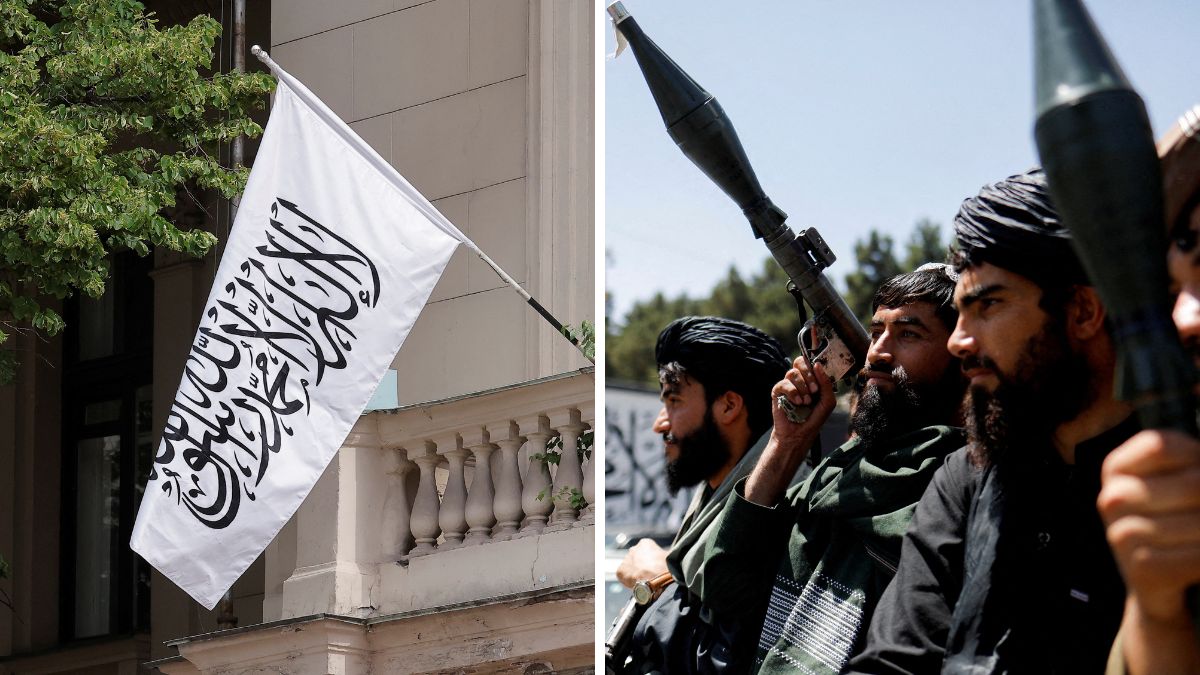From 'F*** off' to friends: Behind Russia's move to recognise Afghanistan's Taliban government
 The Islamic Emirate of Afghanistan flag at the Afghan embassy in Moscow. (Right) Taliban soldiers | Reuters
The Islamic Emirate of Afghanistan flag at the Afghan embassy in Moscow. (Right) Taliban soldiers | Reuters
Russia has become the first country to formally recognise Afghanistan's Taliban by formally accepting the credentials of the country's new ambassador. Afghanistan responded to the move, calling it "courageous".
Russia's Foreign Ministry said Moscow saw good prospects to develop ties as there were "significant trade and economic opportunities, especially in energy, transport, agriculture and infrastructure". It also promised to continue to support Kabul in security, counter-terrorism and combating drug crime.
The new flag of Afghanistan has been hung over the country's embassy in Moscow. The Taliban's white flag bearing the Shahada, the Islamic declaration of faith, was raised by Afghan diplomats on the embassy balcony on Thursday.
Interestingly, both countries were not exactly the best of friends. Wary of Moscow's role in the Soviet invasion, the Taliban had always kept Russia at an arm's length. After the Taliban took Kabul in September 1996, Russia made several attempts to restore relations, worried by the Taliban's support for diplomatic ties with the government of Aslan Maskhadov and recognised Chechnya's independence. Taliban then rebuffed Russian overtures.
After the September 11 terrorist attack, as the US declared war on the Taliban, the latter approached Russia seeking its support to fight "the US aggression". The then head of the Russian presidential administration, Sergei Ivanov, recalled in an interview with the BBC how the Kremlin responded to the Taliban with "the world-famous English-language gesture F*** off."
However, things began to change post-2015. Backdoor meetings between the Taliban and Russian authorities were happening by then, and a report even said Putin met with the then-leader of the Taliban, Mullah Mansur.
But what prompted Russian President Vladimir Putin to become the first country in the world to do so? Though the Russian decision will be watched closely by the US and Western nations, it didn't come as a surprise. A year ago, Russia removed the Taliban from the list of terrorist organisations, with Putin stating how the Taliban were cooperating with Russia in the fight against the "Islamic State". In December, Putin signed a law allowing the Taliban to be removed from the list of terrorists.
Two months ago, the Supreme Court of Russia suspended the ban on the activities of the Taliban in Russia.
Putin's allies in the Middle East and nearby regions are shaky, especially after the collapse of the Bashar al-Assad regime, and the Kremlin's only regional ally now is Iran, which is considerably weakened after the US-Israeli attacks.
Russian orientalist and journalist Ruslan Suleimanov says Moscow began to build contacts with the Taliban against the backdrop of worsening relations with the West. "Russia saw itself as a significant player in the region as this is related to the political immunity that the Taliban received for travelling to Russia," he says.
"The Kremlin wanted to show that the Americans had lost everything, and this was a failure of their foreign policy. Russian propaganda applauded the Taliban, which, in general, continues to this day against the backdrop of incessant anti-Western rhetoric in Russia," he said.
World